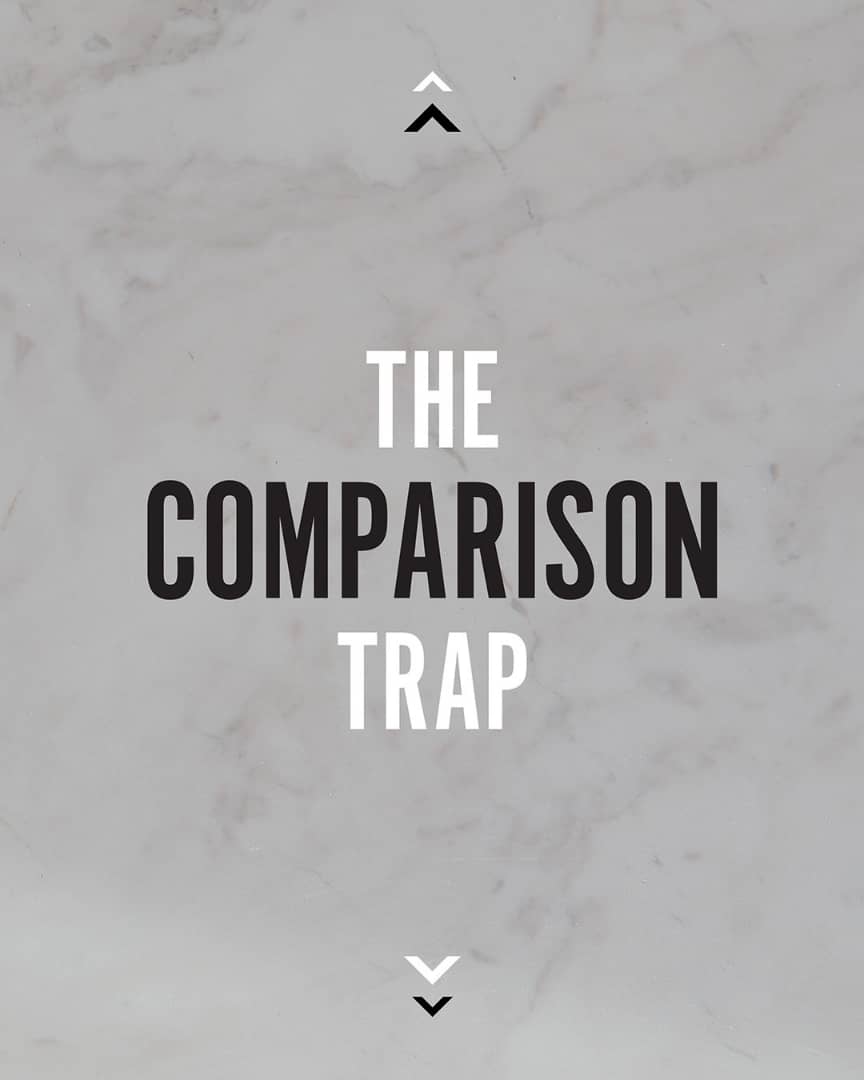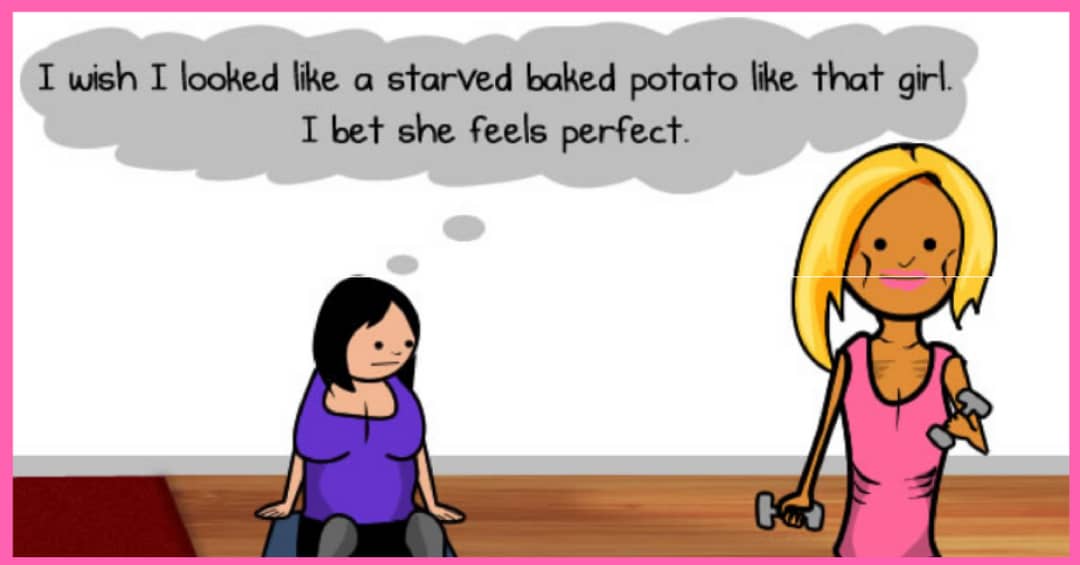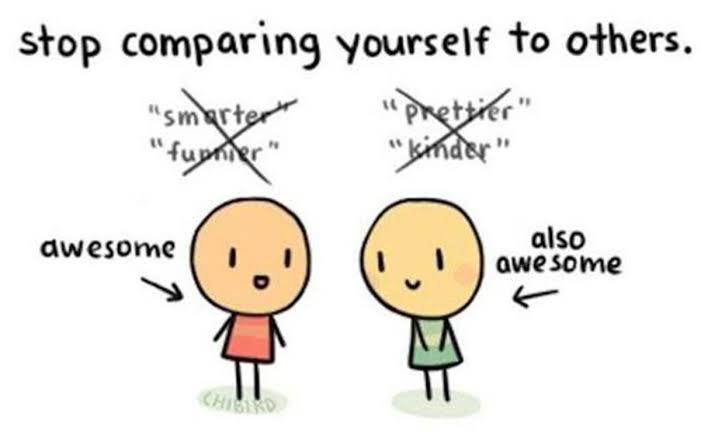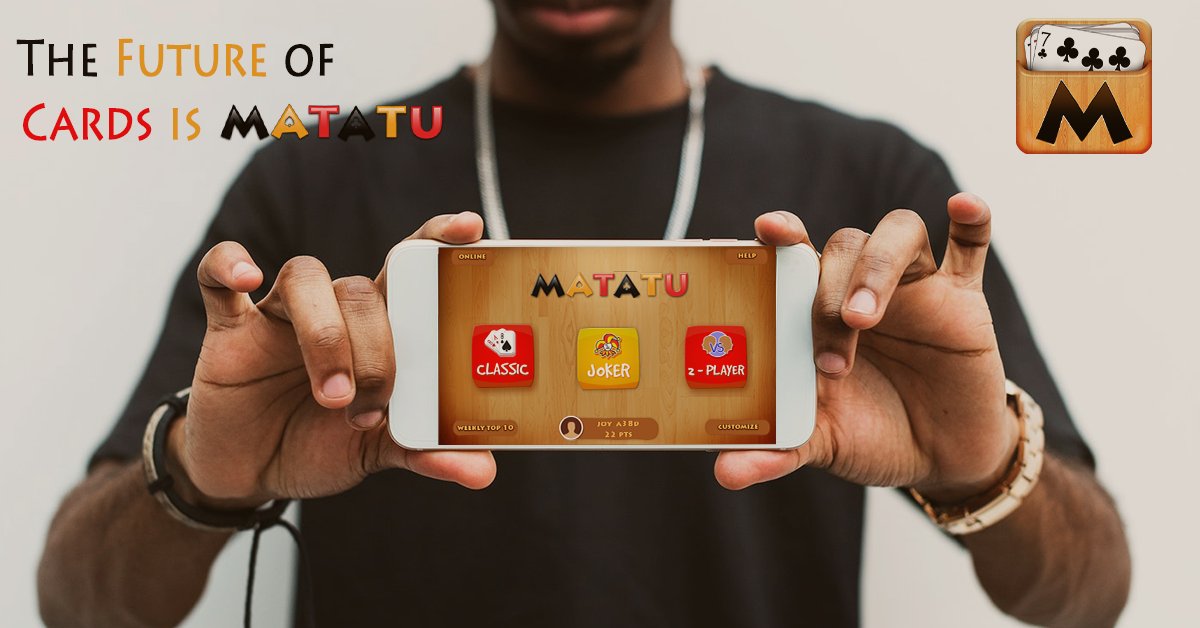Ever found yourself in a web (routine) of comparing yourself to others? Perhaps a family member, a close friend, or someone famous? If the answer is yes, then welcome to the club. The sad truth is that it’s the reality for many of us. The social comparison starts at a very early age. Children discover very quickly that not everyone lives the same life or has the same opportunity as them. They see how some friends have more toys or better clothes, more accommodating parents, or live in nicer houses. As these children grow older and become teenagers, the comparing doesn’t stop. It often intensifies and turns into negative self-talk. Thoughts like “I’m not good enough”, “I can’t do anything right,” or “I’ll never make it” slowly start creeping into their minds. This kind of gloomy thinking causes them to develop anxiety and depression-like impulses, which may continue well into their adulthood years. Mental health experts directly attribute much of modern young adults’ malaise to consequences of social comparison—comparing one’s own accomplishments, looks, social performance, levels of wealth, school grades, or popularity—to their mates and feeling that they’re coming up short, often with devastating consequences. It’s not just college students who compare themselves to others. Most of us have compared ourselves to a friend, colleague, or even a celebrity, in a quest to figure out “how we’re doing” or are going about with putting our lives together.

Well, we have to make peace with the fact that some people are indeed born with more advantages than others: a perfectly symmetrical face, rapid-fire metabolism, wealthy parents, social connections that help them score a coveted job. Yet when we compare ourselves (unfavorably) to others, we often beat ourselves up for not trying hard enough. It’s much more likely that the differences we see reflect an uneven playing field. Hard work just isn’t enough sometimes. Comparisons turn friends and allies into rivals. In a perfect world, we would celebrate and genuinely enjoy the joys and accomplishments of others. Yet if we use others as a benchmark to evaluate ourselves, that creeping twinge of jealousy may undermine our ability to truly cherish the good things that come to others. Just remember: Over time, things may even out, and a friend’s success may enable him or her to support and make opportunities for others (including you). Seeing what others have or have accomplished can instigate feelings of jealousy, malicious envy and unfairness. Instead of feeling happy for someone that we know deserves their good fortune, we allow our own insecurities to take over. We have to be able to get past our negative thoughts and stop feeling sorry for ourselves. This person may be at a different place in their lives where they worked hard and legitimately deserve to succeed. Your feelings of anger and the “poor me syndrome” are preventing you from seeing clearly and can ruin a friendship or potential business contact. You know the adage, comparing apples and oranges.
The question could be; Can we wean ourselves from social comparison? It’s easier said than done. Some psychologists, most notably Leon Festinger, believe that our desire to compare ourselves to others is a drive—one almost as powerful as thirst or hunger. According to the social comparison theory (in a nutshell), we compare ourselves to others for information gathering – as a means of expanding and/or honing our frame of reference for self-assessment. It presumably gives a reality check when objective measures aren’t present or aren’t deemed as relevant. In some cases, we also compare ourselves because we want to boost our motivation to achieve more by finding motivation in the examples “upward” comparison (e.g. someone fitter, more successful, etc.) provides. In other circumstances, we choose to indulge in so-called “downward” comparison to presumably boost our self-esteem by focusing on people in worse situations than those in which we perceive ourselves to be (e.g. more overweight, less fit, less successful, etc.) Comparisons are an everyday occurrence whether it is comparing in a positive way or coming from a darker place. Some schools of thought suggest that comparing is a good way to motivate you while others feel it is a road to disaster. Wonder why? According to social comparison theory, we do this in an attempt to make accurate evaluations of ourselves. But at what cost? While comparison can be a valuable source of motivation and growth, it can also spin us into a tail-chasing frenzy of self-doubt. Whether it’s by our own emotional insecurities or the explosion and novelty of modern media (social media) giving us access to continuous material upon which to compare ourselves, our attempts to keep up with trends have moved beyond the neighborhood and onto the web (internet). This makes it especially important, now more than ever, to think about the downside of using others as a benchmark for our own worth.
Whereas comparison may have some pros as we shall discuss in the next few paragraphs, it has downsides too as we shall see. So, let’s get started on the scenarios where comparison may be of help and positive.
Seeing what others accomplish can positively motivate you to set goals and reach the next level. Knowing that others have achieved something that you want confirms that it is possible and can be realized. Understanding how someone reached their level of success can be a learning experience and help you prepare your pathway. Often times, comparing ourselves to others whom we aspire to emulate can create a mentoring situation or camaraderie that can not only help us to achieve our goals but create an important business contact and friend.
If you compare yourself to others as an exercise of finding where you fit in your niche and how you can be the best person you can be, then that’s a more positive approach that can boost your self-confidence. It also means you are living your best life on your terms and not spending your time copycatting other people’s lives.
Inspiration – When starting out on building our dream, for example, comparing yourself to other folks that have already done this can be the motivation you need. Hearing their stories of initial struggle and how they got through that can help you realize you’re not alone and that you too can achieve.
If you’re guilty of often comparing yourself to others. It is such a poison and here’s why you need to stop right now.
It’s Damaging to Your Sense of Self. Mark Twain once said that “comparison is the death of joy,” I’m sure you’ve heard this saying a million times, but it’s very important to reiterate it. Comparing yourself to others only makes your life difficult and brings you misery and pain. The science agrees as research found that comparing breeds feelings of envy, low-self-confidence, and depression, as well as compromises our ability to trust others. While downward comparison, comparing ourselves to those less fortunate, can provide some benefit to one’s sense of self, even this form of comparison comes at a price. It requires that we take pleasure in someone else’s failures or misfortunes in order to feel adequate, which can fuel mean-spirited competitiveness versus collaboration; jealousy versus connection. When comparison leads you to devalue yourself or others, you’ve entered the dangerous mental territory. Instead, try using others as motivation to work harder and do better; not beat yourself up.

Comparing ourselves to others allows them to drive our behavior. This type of comparison is between you and someone else. Sometimes it’s about something genetic, like wishing to be taller, but more often it’s about something the other person is capable of doing that we wish we could do as well. Sometimes this comparison is motivating but most times destructive.

When we compare ourselves to others, we’re often comparing their best features against our average ones. It’s like being right-handed and trying to play an instrument with your left hand. Not only do we naturally want to be better than them, the unconscious realization that we do not often become self-destructive.
What people present to the outside world is usually an edited version of their reality. When someone asks you how you are doing, how often do you respond by saying, “my girlfriend is driving me crazy, I’m feeling like a failure at work, and I’m just about ready to lose my mind”? Instead, you probably bite your tongue and say “things are really great!” According to a recent study in the Personality and Social Psychology Bulletin, it was confirmed that people are less likely to reveal their negative emotions than their positive emotions. Additionally, the study found that people tend to overestimate the presence of positivity in the lives of others, while they misinterpret or fail to detect negative feelings in others. So not only is what’s being delivered an incomplete picture, we tend to distort the information we do receive — a double whammy. So next time you find yourself comparing to someone else stop and ask yourself if it is really fair to compare when you don’t have all of the information.
If comparing is how you evaluate your worth, you will always be losing. In this game of life, you will never reach a point where you are better than others in every way and why would you want to be. Part of what makes life awesome and interesting is learning from the talents of others. Instead of trying to be as good as or better than others, focus your energy on being the very best version of yourself. So next time you catch yourself using someone else as a benchmark for your own worth stop and remind yourself how ineffective this strategy really is. Instead, compassionately redirect your energy and attention to your own goals and what is required to achieve them.
Loss of Identity – We often fill ourselves so much with the ideas of others that we start to lose sight of our own ideas and identity. This can be really dangerous. You must stay true to who you are and the ideas you have. You must work in a way that suits you and your style. Don’t get lost in the fog of comparison and lose sight of yourself. Clear some space for your own ideas rather than everyone else’s.
The Showreel – We often forget that in this beautiful online world we can craft the image we want people to see. When you get caught up in comparison it’s easy to forget that we’re only seeing what people want us to see. We don’t have a backstage pass to what’s really going on. So, it’s really not fair to think that we’re the only ones who haven’t got it all figured out yet.
Others’ so-called “perfection” is an illusion. The glorious vacations, the enviable professional accomplishments, the perfect children and spouses you see on your friends’ Instagram are just one sliver of their real lives. It’s the truth, but not the “whole truth and nothing but the truth.” A friend may proudly announce the publication of their new novel, but conceal (hold back or keep to themselves) the 12 rejections their manuscript received before being published. You can’t know what failures and even what successes someone else has gone through to get to where they are today. If we knew others’ whole truths, we might not feel so inadequate when comparing ourselves to their carefully crafted public images of “perfection.”
Life becomes about being a better version of yourself. And when that happens, your effort and energy go toward upgrading your personal operating system every day, not worrying about what your coworkers and mates are doing. You become happier, free from the shackles of false comparisons and focused on the present moment.
Compare yourself to who you were this morning. Are you better than you were when you woke up? If not, you’ve wasted a day. It’s less about others and more about how you improve relative to who you were. When you stop comparing people and focus internally, you start being better at what really matters: being you. It’s simple but not easy.
The most important things in life are measured internally. Thinking about what matters to you is hard. Playing someone else’s scoreboard is easy, that’s why a lot of people do it. But winning the wrong game is pointless and empty. You get one life. Play your own game.
The comparison will stall your progress. If you spend your days comparing yourself to other people’s achievements, you’ll never get anything accomplished. You must invest all your energy into pursuing your own dreams and goals. Don’t waste your precious time on those of others.
No one has a perfect life. Although you might think that a lot of people are leading an amazing life with no downsides, know that this isn’t true. Every single person on this Earth experiences problems and challenges throughout their lives. No one is exempt from this. Some people are just better at keeping it together, at least on the outside. So next time you compare yourself to your friend or neighbor, remember that you probably do not know every detail about their life.
There will always be someone better than you at something. I know this last point might seem a little harsh, but it’s the reality. So, the sooner you accept it, the happier you’ll be. There will always be someone better than you at one point in your life. At some point in your life, someone will beat you to whatever it is you’re after. You can’t always win at everything in life. All you have to do is work hard and try your best, and whatever is meant to be will fall into place for you at the right moment.
How to manage the urge to compare:
Be kind to yourself and don’t compare your chapter 1 to someone else’s chapter 20.
Fear, doubt and lack of worthiness are not the ideal breeding ground for you to do your best work. Create an environment that supports you and your ideas, and playing the comparison card.
Stop looking for answers you know you already have within you. Trust yourself enough to go after what feels right for you.
There is one thing that you’re better at than other people: being you. This is the only game you can really win. When you start with this mindset the world starts to look better again. No longer are you focused on where you stand relative to others. Instead, your focus and energy is placed on what you’re capable of now and how you can improve yourself.
Focus on your story. Your direction. Your style.
Stay away from media that sends you down a negative comparison spiral. Be selective on who you follow and influence you.
I’m all for aspiration, but don’t believe for a second that you’re not ready or not worthy where you are right now.

In Summary:
The most important things in life come from the inside, not the outside.
Comparing yourself to others is a recipe for unhappiness.
You can be anything but you can’t be everything.
You’ll never be the best at anything. The world is a big place with millions of people; it’s impossible to be the best. Just do your best, and you’ll be fine.
Your race isn’t about other people and where they are
There is one thing that you’re better at than other people: being you. This is the only game you can really win.
Compare yourself to who you were yesterday.
Do remember: Each time you appreciate your uniqueness and share it with others is a win in the confidence department of your life. At the end of the day, the only person you should really be comparing yourself to is the person you were yesterday.
Thanks for reading today, everyone. How has comparison served or sabotaged you in the past? I’m curious to hear your feedback. Have a great week ahead y’all.













